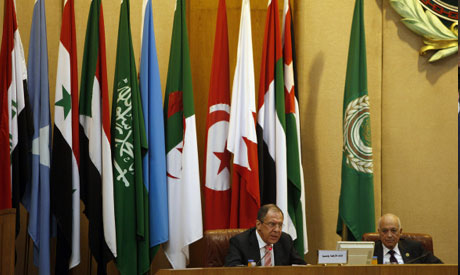
Sergey Lavrov, Nabil Elaraby at the Arab League in Cairo
Despite assurances offered by Russian Foreign Minister Serge Lavrov to Arab interlocutors at an Arab League meeting on Syria on Saturday on Russia’s commitment to help contain the bloodshed in Syria, scepticism remains on how far Moscow is actually willing to go to honour these assurances.
Arab League officials who took part in Saturday’s meeting said it was hard to decide exactly how to qualify the Russian position, since Lavrov was still not committing to reversing his country's opposition to an Arab initiative based on a power transition from Syrian President Bashar Al-Assad to his vice president. On the other hand, however, the top Russian diplomat was more forthright about the need to provide humanitarian assistance to the Syrian people and the need for the UN Security Council to take a position against the continued violence "whether that committed by the regime or by some parts of the opposition" in Syria.
Following the talks on Saturday, Lavrov departed Cairo for New York, where he is scheduled to meet with his Security Council counterparts to consider a new draft for a resolution on Syria.
Russia and China twice used vetoes to block Western and Western-Arab drafted resolutions calling on the Syrian regime to end the violence it has been exercising against the opposition.
Arab officials say they are not exactly sure about the drafting tricks that might make an agreement on a future UN Security Council resolution possible.
Arab states told Lavrov on Saturday that they would agree to a resolution stating the need to suspend all forms of violence "irrespective of the source" of that violence. They added, however, that they would not settle for any language equating the violence of the regime to that of the opposition.
In press statements made on the sidelines of the Arab League meeting on Saturday, the foreign ministers of Saudi Arabia and Qatar joined in criticising the ongoing "massacre" in Syria and said that the situation could not be left to fester.
A five-point agenda that was jointly agreed upon by the foreign minister of Russia and his Arab interlocutors in Cairo on Saturday opened the door for the endorsement of a mission by UN-Arab League Envoy to Syria Kofi Annan and the possibility of sending joint UN-Arab peacekeeping forces to the troubled country. However, according to several Arab diplomats whose countries took part in Saturday’s meetings, peace must first be established before peacekeeping forces could be sent there.
Peace in Syria, according to Syrian opposition figure Walid Al-Bunni, "can never be secured if Al-Assad remains in power.”
Speaking to Ahram Online Sunday morning, Al-Bunni said that many parts of the Syrian opposition – especially the groups in exile – were becoming hopeful over "the seeming change in the attitude of Russia, which now appears more open to the need to end the bloodshed in Syria.”
"I guess what we could conclude from the positions expressed by Lavrov at Saturday’s meeting [at the Arab League] is that, while Russia is still fully supporting Al-Assad, it is now making this support conditional on his cooperation with the Arab League and the UN to find a way out of the current crisis," Al-Bunni said.
However, Al-Bunni added: "It’s only if Russia, and for that matter China, supported a UN Security Council Resolution calling for an immediate end to violence in Syria that we would see a real change in Moscow’s position towards the Syrian people.”
Al-Bunni also said that consultations were ongoing for an all inclusive get-together of Syrian opposition groups to "draft a common vision for the country’s future." He declined, however, to suggest a place or a tentative timeframe for the proposed meeting.
Arab League sources, meanwhile, voiced scepticism over the chances that this meeting would take place anytime soon, insisting that current divisions within the Syrian opposition were still too deep.
"This is one of the main problems in handling the Syrian file – you don’t have a unified opposition that can live up to the challenges if Al-Assad is actually forced out of power," said one Arab League source. “And at the same time, the opposition – especially the groups in exile – are too reluctant to accept any arrangement that might involve Al-Assad.”
Short link: